Janine Jackson interviewed Good Jobs First’s Arlene Martinez about Amazon‘s subsidized misconduct for the December 6, 2024, episode of CounterSpin. This is a lightly edited transcript.
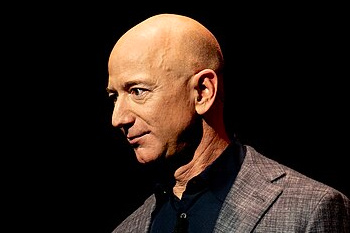
Jeff Bezos (CC photo: Daniel Oberhaus)
Janine Jackson: “It is difficult to get a man to understand something when his salary depends upon his not understanding it.” So wrote Upton Sinclair in 1934. It’s hard not to think about that as we see corporate news media report on Amazon, whose leader is, of course, the owner of the Washington Post, but whose influence as retailer, landowner, policy shaper is multi-tentacled in ways you and I probably don’t even know.
That outsized, multi-front power is behind the resistance to Amazon, the urgent need to illuminate what a private company on this scale can do in the country and the world’s political, consumer, regulatory, labor ecosphere, and what needs to happen to address that power.
Arlene Martinez is deputy executive director and communications director at Good Jobs First. She joins us now by phone. Welcome back to CounterSpin, Arlene Martinez.
Arlene Martinez: Hi. Thanks for having me.
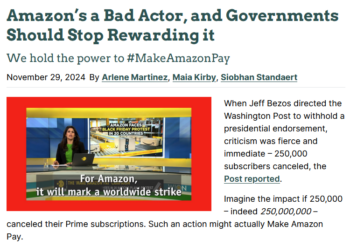
Good Jobs First (11/29/24)
JJ: You wrote recently, with colleagues, that the #MakeAmazonPay campaign was about calling attention to Amazon‘s
mistreatment of workers, disregard for consumers whose data it misuses, bullying of small local businesses and accelerating climate destruction, especially during the holiday shopping season.
That’s before we get to how we the people enable all of that through government subsidies, which we will talk about.
But first, let’s talk about some of the documented complaints and concerns about Amazon‘s day-to-day practices, the way they operate. Because it’s not about “hating them because they’re beautiful.” It’s not about jealousy because they built a better mousetrap. This is concern about things that just shouldn’t happen, period, right?
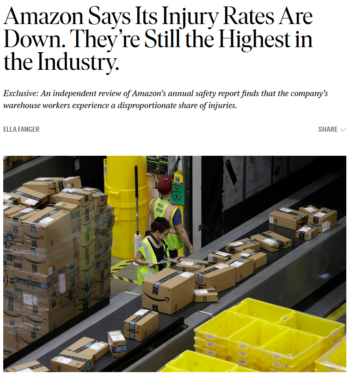
The Nation (5/2/24)
AM: That’s right. And I really liked the way that you opened up our conversation here, because it’s really hard to overstate just how powerful Jeff Bezos is, and how many areas Amazon is in, and the way that they run their business across all the different areas that they touch, how harmful it is, whether you’re talking about the environment, and all the data centers that they’re building as they capitalize on AI, artificial intelligence. Or the way that they are so punishing to workers that the injury rate is several times that of any other warehouse company. How they drive down wages wherever they locate. How they squeeze small businesses; a report from the Institute of Local Self-Reliance found that 45 cents of every dollar that a business made selling on the Amazon platform went to Amazon.
So I could just go on and on, but there are so many ways that Amazon harms the entire ecosystem of business worldwide. And one of the worst parts about it, and there are a lot of bad parts about it, is that we are subsidizing that, because communities are giving Amazon billions of dollars in direct cash payments. They don’t have to pay their taxes, or they’re given straight cash, or reduced land, whatever the case may be. And that doesn’t even begin to include the procurement and other public contracting money that they received. I’ll open there.
JJ: Well, and I want to get into that. I think for many folks, maybe they’ve heard about workers being cheated out of wages, but that is so crucial to the subsidy conversation. But let’s start with the fact that we do have evidence that Amazon is under-serving their workers, not just in terms of wages, but also in terms of health and safety, and what do we know about that?
Good Jobs First: Violation Tracker
AM: We run a database called Violation Tracker, where we look at over 450 regulatory agencies that we get data from, so we can begin to see part of Amazon‘s behavior toward its workers. We capture how much money Amazon has stolen from its workers, in the form of wages, and we also look at some health and safety violations.
One of the reasons that Amazon‘s dollar total is so much lower than, for example, Bank of America, which has billions and billions and billions of dollars in penalties and fines—Amazon‘s comparative total is so much lower because the federal agencies that are in charge of protecting workers only have the authority to give thousands of dollars in fines, versus a regulatory agency that oversees banks that can give billion dollars in fines in one single case. So what we see is, as bad as Amazon‘s record is, and it is bad, it would be worse if we treated workers with the same care and with the same concern that we do as investors who got cheated on an investment.
JJ: That’s so deep, because it speaks to, like, folks might want to get mad at a corporation, like Amazon, but then you also have to understand the weakening of the regulatory agencies that are meant to be addressing that. It’s not as simple as one might hope it would be. And folks have heard, for example, on this show, talking about the IRS saying, “We understand that rich people cheat more on their taxes than poor people, but it’s easier for us to go after poor people, because it’s much simpler.” And so a company like Amazon can just make things so complex, in a regulatory framework, that it’s very hard to address the harm that they’re doing. It’s kind of a big-picture problem.

Arlene Martinez: “So many of the issues with Amazon, and the reason that Amazon exists in the first place, is because we’ve lacked a lot of the regulatory mechanisms to contain it from ever becoming this big.”
AM: Yeah, that’s right. So many of the issues with Amazon, and the reason that Amazon exists in the first place, is because we’ve lacked a lot of the regulatory mechanisms to contain it from ever becoming this big. If, for example, some of the antitrust legislation had been implemented and upheld, Amazon never might have been able to grow to this size. That’s why it’s been so promising in recent years to see the FTC and Lina Khan really take on corporate giants like Amazon, which have essentially become monopolies and dominate entire spaces. So it really is a big structural issue.
I get asked a lot about, should people just not shop on Amazon? Well, that would be nice. I mean, I don’t shop on Amazon, but that isn’t the answer. Like I said, it would be nice, but the answer is really these structural problems that enabled Amazon to get so big in the first place. And these regulatory agencies need to flex their muscle to make sure that Amazon is broken up, or contained, or not allowed to dominate entire industries and sectors the way that it is.
And you’ve probably seen it’s moving into even more areas. Now it’s going into chips, and now it’s going into pharmacies and healthcare. And its goal is to dominate the world, and it’s headed there without some proper agency there flexing their muscle to rein it in.
JJ: I wanted to pull you out on one question, which is data centers, which is, we hear, and folks at the local media level may hear, Amazon‘s coming in, and they’re going to locate here, and that’s going to provide jobs. And sometimes what they’re talking about is data centers. Why don’t data centers equal jobs? Can you talk a little bit about that?
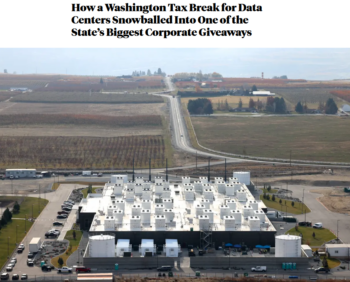
ProPublica (8/4/24)
AM: Data centers are essentially huge warehouses that just store big, basically, server farms. They’re just running data all the time, and there’s very few people that are needed to actually staff these facilities. So they don’t create many jobs, because there aren’t many functions that are required as part of these data centers. I mean, there’s the construction phase, and then a few dozen people that are needed to staff them.
And yet they’re getting what’s often several million dollars per job. We did a study in 2016 that looked at the average for the Apples, the Googles, the Amazons, the Metas, was about $2 million per job. But we’ve seen a lot of cases now where it’s a lot higher per job, and a community can never make that money back.
But I think the other question, too, and I think what gets missing from a lot of stories that I see about data centers, is why data centers are getting subsidized in the first place. When you think about what an incentive was supposed to even do in the first place, it was to spur something to happen that wouldn’t otherwise happen.
We know that AI is the future. These companies are racing to build data centers, because they have to, to remain competitive. So there is absolutely no business case to be subsidizing companies to build a data center, especially considering the low job return.
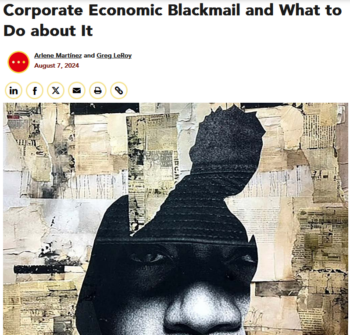
Nonprofit Quarterly (8/7/24)
JJ: In this deep piece about corporate government giveaways, you cite Neil deMause, who is a FAIR favorite, who, with Joanna Cagan, wrote Field of Schemes about subsidizing sports teams’ building of new arenas, and it’s kind of a familiar template, where folks say we’re going to bring in profit, and yet it’s something that would happen anyway. There’s kind of a—it’s not even a bait and switch, it’s just misinformation that is put forward to cities, when something like a sports team, or something like an Amazon, says, “We’re going to bring a lot of stuff to your community, and therefore you should subsidize our taxes.”
And some of us are like: “Well, wait, you’re a business. You’re going to make a profit here. Why would we subsidize it?” There’s kind of a big-picture misunderstanding here.
AM: Yeah, and part of it is that it just becomes irresistible for a lot of politicians to have the opportunity to stand next to a Jeff Bezos, or some other high-ranking official, or a billionaire owner of a sports team. And then you have access to these box-level seats that you couldn’t afford on your own. And all of that is really irresistible. So there’s really a very human element to giving subsidies that are proven to not drive economic development, like a stadium, which study after study has shown does nothing to improve the lives of residents in that community, but it just becomes very irresistible.
And I think on a local level, too, with someone—I was a reporter for many years, covering a lot of city council meetings and school board meetings, and knowing that these council members, most of them who are part-time, get a few hundred dollars a month in pay, they want to do good for their community, and they think bringing in an Amazon is a good move for their community, without realizing what they’re really doing is bringing in a company that hurts their workers, pays them very little and damages their existing small businesses in their community. But they’re thinking they’re doing a good thing.
JJ: Well, and part of it is a kind of numerical thing where media talk about, “Well, these folks will pay this money in taxes,” and that makes it sound like it’s a profit. There’s kind of a basic math problem that sometimes happens here. When you talk about tax breaks to be given to whatever entity, media can sometimes present that as though that’s money that’s going into the tax coffers, which is not what’s happening.

Nonprofit Quarterly (8/3/22)
AM: That’s right. I mean, there’s a lot of companies that really profit based on the size of the incentive. There are a lot of site location consultants, for example. The bigger the subsidy, the more their percentages. So their drive is to get the biggest subsidy possible, even though it isn’t in the best interest of their community.
JJ: Subsidies are sold to communities as profit, as though it’s going to be money, somehow, that’s going to go right into the community, when that’s not the way it plays out.
AM: Yes, and this is a big issue in our space, in terms of the media coverage that we often see. It’s because you get what are called “economic impact reports,” and I say “economic impact” in quotes because it isn’t actual economic impact, and it’s nowhere close to being a cost/benefit analysis. What it does is it takes this big, big smorgasbord of everything, every dollar that’s spent on construction phase, or supply chain, or the entire salary sometimes of a worker is included in this economic impact report. And a lot of times you have no idea what’s actually in there, because the people who produced it say it’s proprietary, and they won’t give it to the public.
And a lot of times, those people that are hired to produce the economic impact report, and we see this a lot in the stadium space, are people who are working for the team owners, or who are working for Amazon, they will be the ones producing these economic impact reports. So you have a real conflict of interest that I think is missed sometimes in the reporting, and just makes these studies bogus.
When I talk to reporters about how to cover and report on economic development incentives, I tell them to ask for everything that went into that economic impact report. And if they don’t release it, then don’t include their numbers, and say that they won’t give it to you.
JJ: That gets right to the point of transparency, which I just wanted to ask you about. I think that, whether you understand an issue or don’t, transparency about what’s happening ought to be ground zero. And yet that is difficult to get from some corporations, and also from some government agencies. But journalists should have that as a basic fundamental.
AM: Yes. And we also run these databases called Amazon Tracker and Subsidy Tracker, and both of them look at companies that have received subsidies. And you’ll see, among Amazon subsidies, and also Subsidy Tracker, which is broader, you’ll see a lot of entries that say “undisclosed,” because even though a company is getting public money, they’re not releasing the value of that subsidy. Reporters should insist on that, and make it really clear in stories when they’re not getting it.
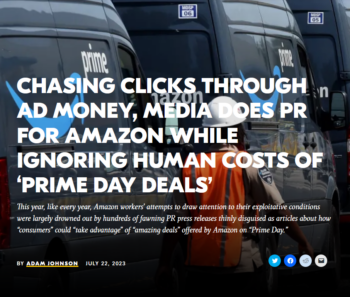
Real News Network (7/22/23)
JJ: And I’ll end on that. But I will say that, obviously, I’m angry about media for my job, but it’s not that they don’t do critical stories sometimes; it’s this connecting of the dots. So when I see a storyline that says that Amazon or Walmart is a “successful business,” and then I see another story that says, oh yeah, a lot of their workers still need to rely on public assistance to not starve. But then on the other page, I’m still reading Amazon as a “successful business.” So I feel like at a certain point, it’s not about there’s never any good stories or critical stories. It’s about a failure to connect the dots, to say, “What does it mean for a company to be ‘successful’ right now, and what harm is required to get to that?”
AM: Those are all such great points, and it’s true that we have seen a lot of really amazing reporting around Amazon, and Bloomberg is the outlet that reported about how Amazon was driving down wages in the warehouse sector, because they took an industry-wide look, and were able to see that anytime Amazon entered a community, wages dropped for the entire sector, including non-Amazon workers.
And the Morning Call in Allentown, Pennsylvania, wrote one of the first stories, 12 years ago, to report on ambulances being placed outside of Amazon warehouses, rather than Amazon investing in air conditioning and heating for their workers. So they were getting ill from heat exhaustion.
So there has been a lot of amazing reporting, but I think you’re right in connecting all those dots, it’s very hard to see. And when Amazon releases a press release about how they gave a $500,000 loan, reporters repeat that as if it’s some gift, even though it might not include the fact that Amazon got a billion dollars in that same community as a subsidy. So it is a mixed bag.
JJ: I appreciate the bright critical spots. I’m upset about the fact that it doesn’t seem to get stirred into an understanding of what we, as a democratic society, should ask from corporations, and why do we call a company “successful” whose workers need to rely on public assistance? There’s some kind of connected story that’s not happening there.
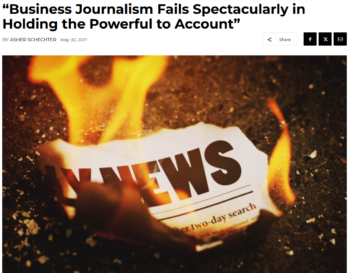
ProMarket (5/30/17)
AM: I’ll just add, I remember as a reporter—and I was a reporter for many years—I was very fixated on holding government accountable. Really felt like that was a big role of mine, and I spent a lot less energy thinking about holding corporations accountable. And now that I’ve left the space, and I’m in this nonprofit watchdog space, and a lot of my work involves corporate governance, and overseeing their practices, I really see those gaps even more stark, and how, in general, I think journalists don’t do the best job about covering companies, and we could do a lot better, which is why I think shows like yours are so helpful, why I hope organizations like ours are useful, so that we start putting the same kind of scrutiny on corporations that we have long done on governments.
JJ: I will just add, we hope for journalists to look to see critically powerful actors, and those powerful actors are in corporations, and they’re in government. And then here’s us, we the people, and that’s where we would look for journalists to look out for the public interest, however that is affected by whatever forces are in power, and that’s why I appreciate your work.
AM: Thank you so much.
JJ: We’ve been speaking with Arlene Martinez. She’s deputy executive director and communications director at Good Jobs First. You can find their extensive work on Amazon and other corporate and government accountability on GoodJobsFirst.org. Arlene Martinez, thank you so much for joining us this week on CounterSpin.
AM: Thanks for having me, and thanks for your work.
This content originally appeared on FAIR and was authored by Janine Jackson.
Janine Jackson | Radio Free (2024-12-10T22:27:22+00:00) ‘Regulatory Agencies Need to Make Sure Amazon Is Broken Up or Contained’CounterSpin interview with Arlene Martinez on Amazon misconduct. Retrieved from https://www.radiofree.org/2024/12/10/regulatory-agencies-need-to-make-sure-amazon-is-broken-up-or-containedcounterspin-interview-with-arlene-martinez-on-amazon-misconduct/
Please log in to upload a file.
There are no updates yet.
Click the Upload button above to add an update.